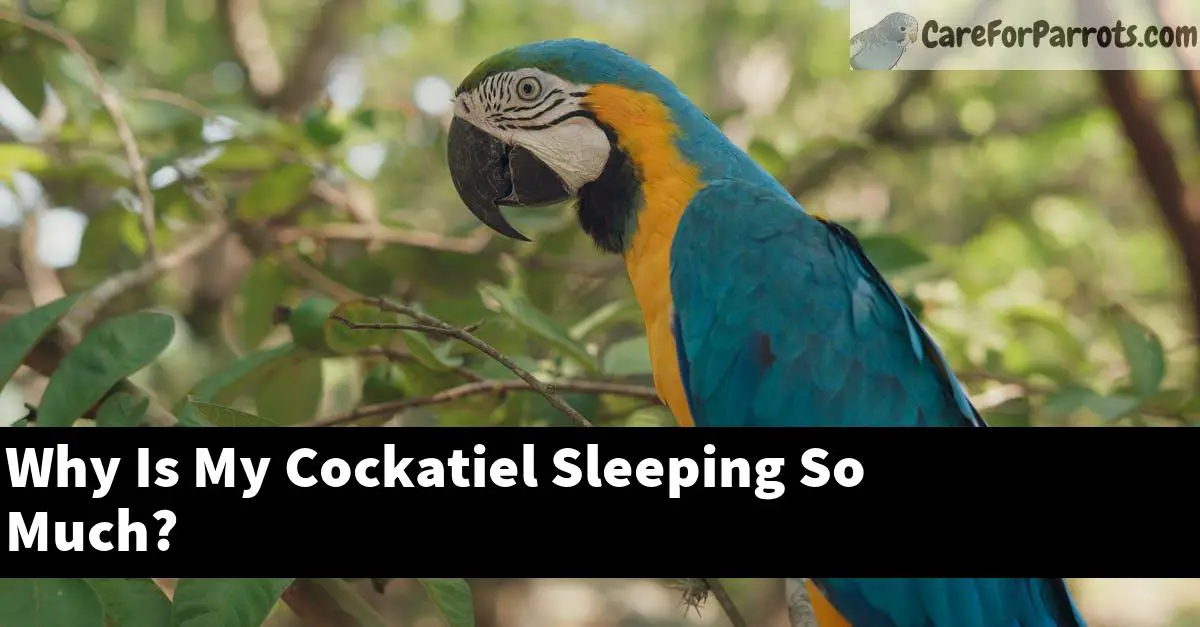Cockatiels are delightful and social pets, but sometimes their behavior can leave their owners puzzled. One such concern that arises among bird enthusiasts is when their cockatiel seems to be sleeping more than usual.
Is this something to worry about?
In this article, I will explore the reasons behind excessive sleep in cockatiels and how to address it.
Table of Contents
Understanding Cockatiel Sleep Patterns
Normal Sleep Duration for Cockatiels
Cockatiels, like most birds, have a natural sleep pattern that closely follows the day-night cycle. They typically sleep around 10-12 hours per night and take short naps during the day. However, various factors can influence their sleep patterns.
Factors Affecting Cockatiel Sleep
Age
Younger cockatiels may sleep more than adults, while older birds may require additional rest to maintain their health.
Environment
Cockatiels are sensitive to their surroundings, and a noisy, bright, or stressful environment can disrupt their sleep patterns.
Season
During the colder months, cockatiels may sleep more due to decreased daylight hours and lower energy levels.
Reasons for Excessive Sleep in Cockatiels
Illness or Disease
Excessive sleep can be a symptom of illness or disease in cockatiels. Some possible health issues include:
Infections
Bacterial, viral, or fungal infections can cause lethargy, making your cockatiel sleep more.
Parasites
External or internal parasites can also lead to increased sleep as the bird’s body tries to conserve energy to fight off the infestation.
Nutritional Deficiencies
A lack of proper nutrition can lead to excessive sleep in cockatiels.
Importance of a Balanced Diet
A balanced diet, including pellets, seeds, fruits, vegetables, and other healthy foods, is essential for your cockatiel’s overall well-being.
Signs of Malnutrition
If your cockatiel shows signs of lethargy, poor feather quality, or weight loss, it may be suffering from malnutrition.
Stress and Anxiety
Stress and anxiety can also lead to excessive sleep in cockatiels.
Identifying Stressors
Common stressors include a new environment, loud noises, or other pets in the household. Observe your cockatiel’s behavior to identify potential stressors.
Managing Stress
To reduce stress, provide your cockatiel with a calm and quiet environment, offer toys and enrichment activities, and establish a consistent daily routine.
When to Consult a Veterinarian
Recognizing Warning Signs
In addition to excessive sleep, look for other signs of illness or distress in your cockatiel, such as changes in appetite, unusual vocalizations, or abnormal droppings. If you notice any concerning symptoms, it’s essential to consult a veterinarian specializing in avian care.
Importance of Regular Checkups
Regular checkups with an avian veterinarian are crucial for maintaining your cockatiel’s health. These visits allow the vet to identify any potential issues before they become serious and provide guidance on proper care and nutrition.
Conclusion
Excessive sleep in cockatiels can be a cause for concern, but understanding the factors affecting their sleep patterns and recognizing signs of illness or stress can help you address the issue. Monitor your bird’s behavior, provide a balanced diet and a comfortable environment, and consult a veterinarian when needed to ensure your cockatiel remains happy and healthy.
FAQs
1. How much sleep do cockatiels typically need?
Cockatiels usually need around 10-12 hours of sleep per night, with occasional naps during the day.
2. Can a change in the environment cause my cockatiel to sleep more?
Yes, changes in the environment, such as noise, light, or temperature, can disrupt your cockatiel’s sleep patterns and potentially cause them to sleep more.
3. How can I tell if my cockatiel is stressed?
Signs of stress in cockatiels include excessive sleep, feather plucking, aggression, or a change in vocalizations.
4. What kind of diet should I provide for my cockatiel?
A balanced diet for your cockatiel should include pellets, seeds, fruits, vegetables, and occasional treats like nuts or cooked grains.
5. How often should I take my cockatiel to the veterinarian?
It’s recommended to take your cockatiel for a checkup with an avian veterinarian at least once a year or more frequently if you notice any signs of illness or distress.






